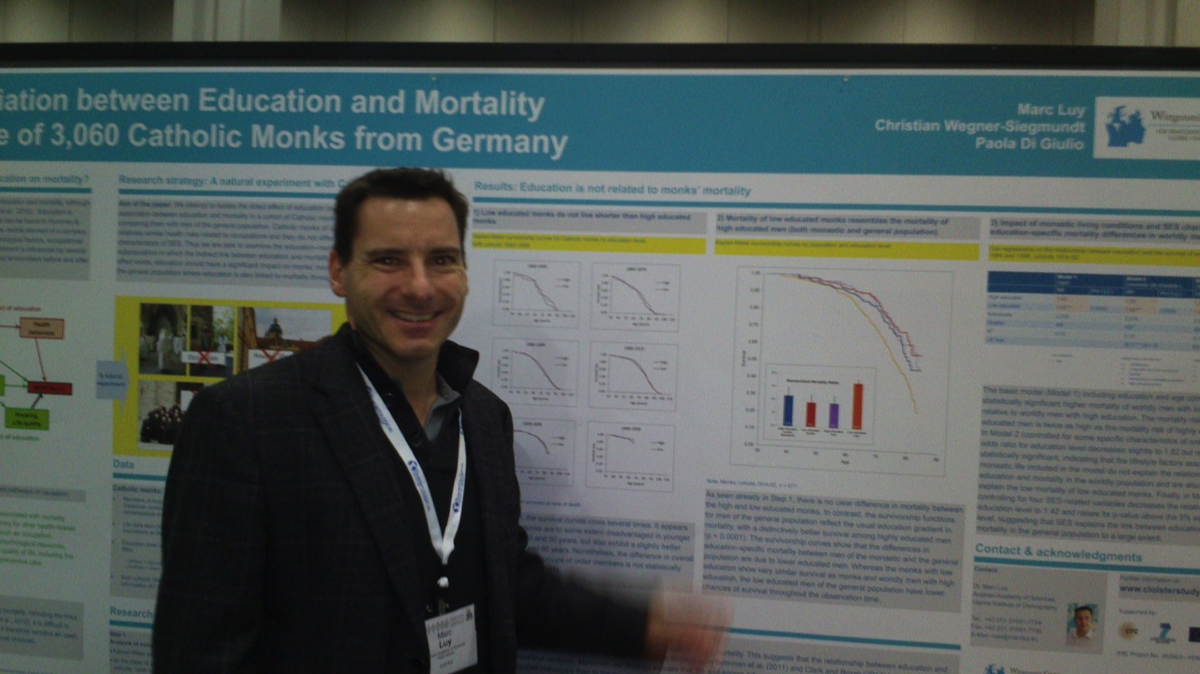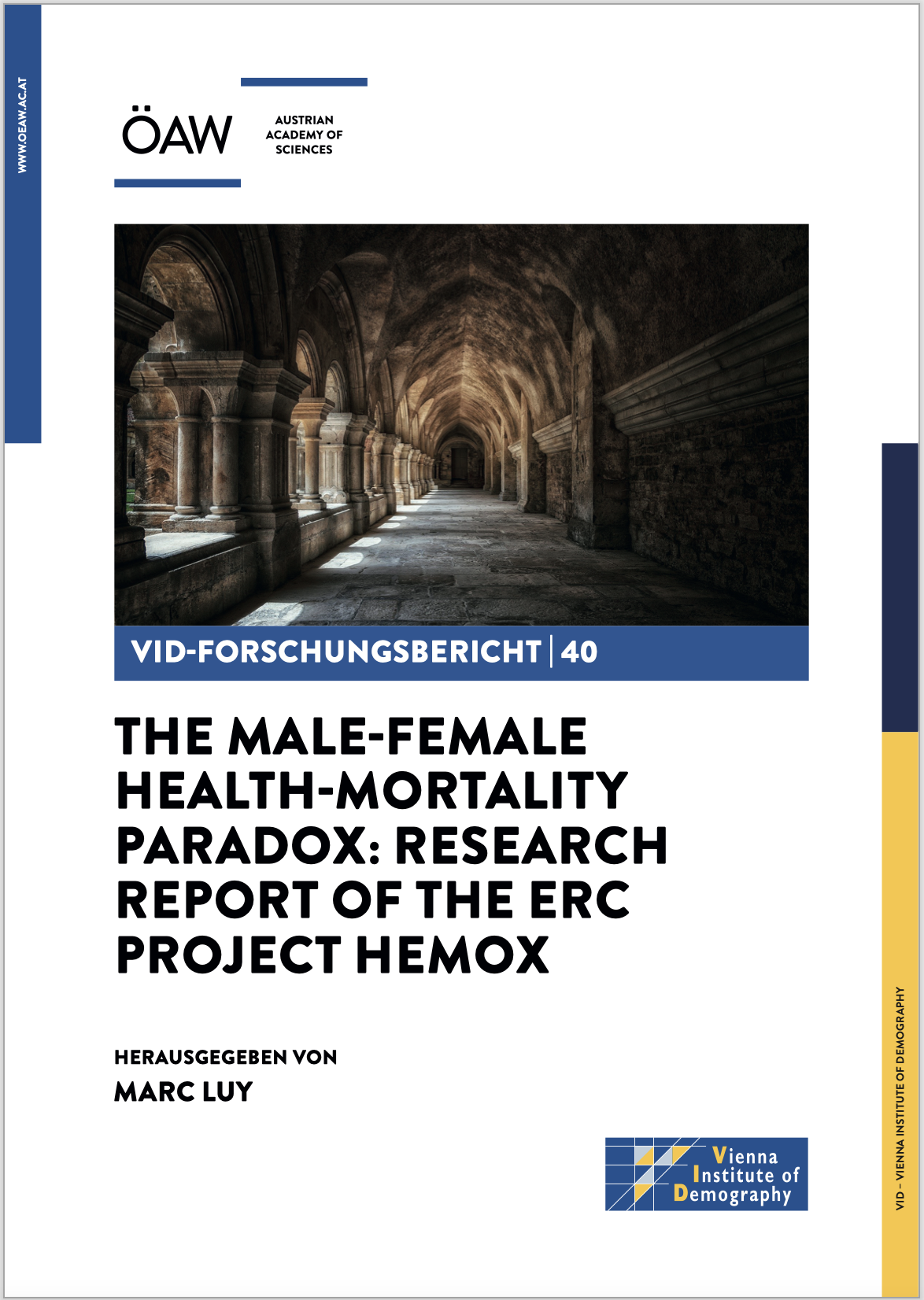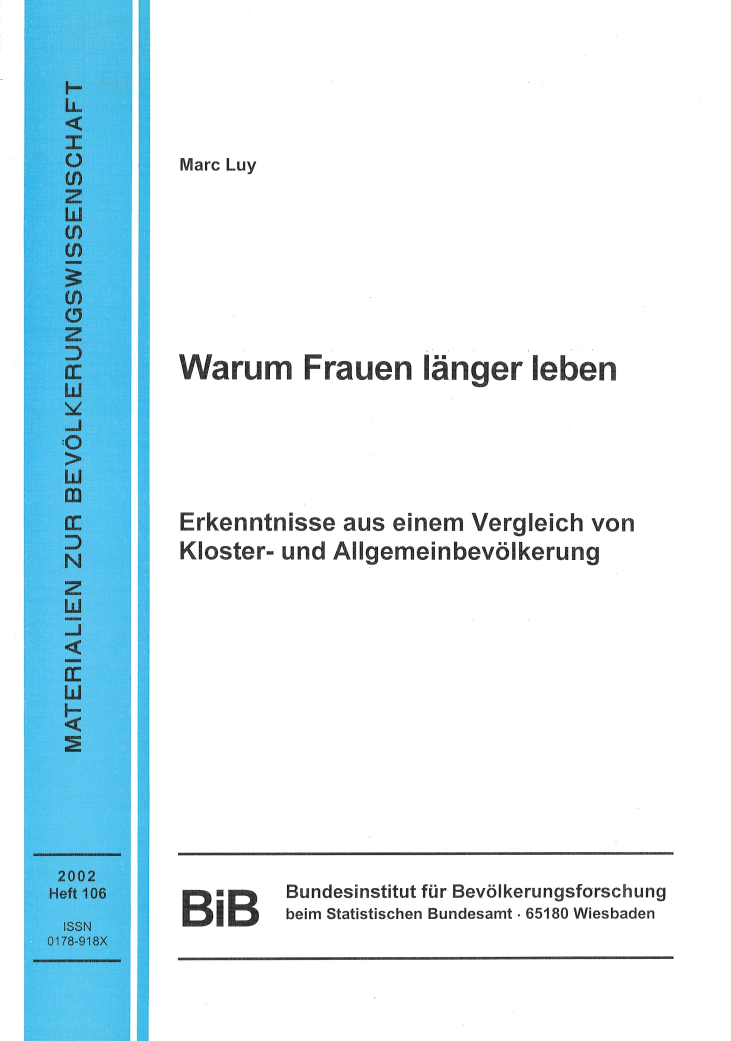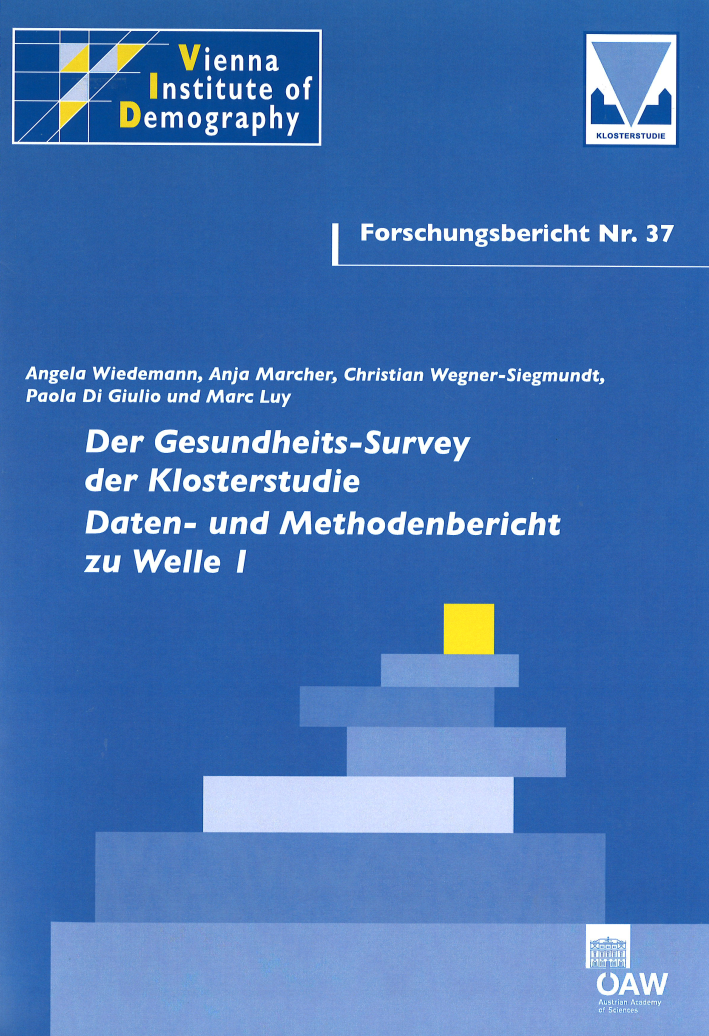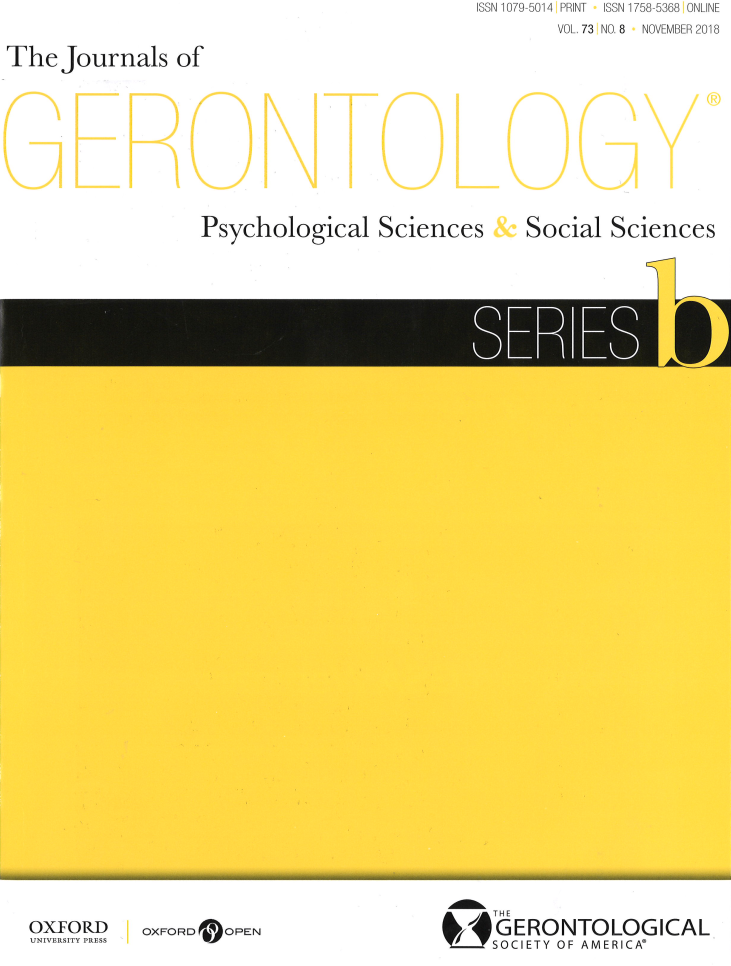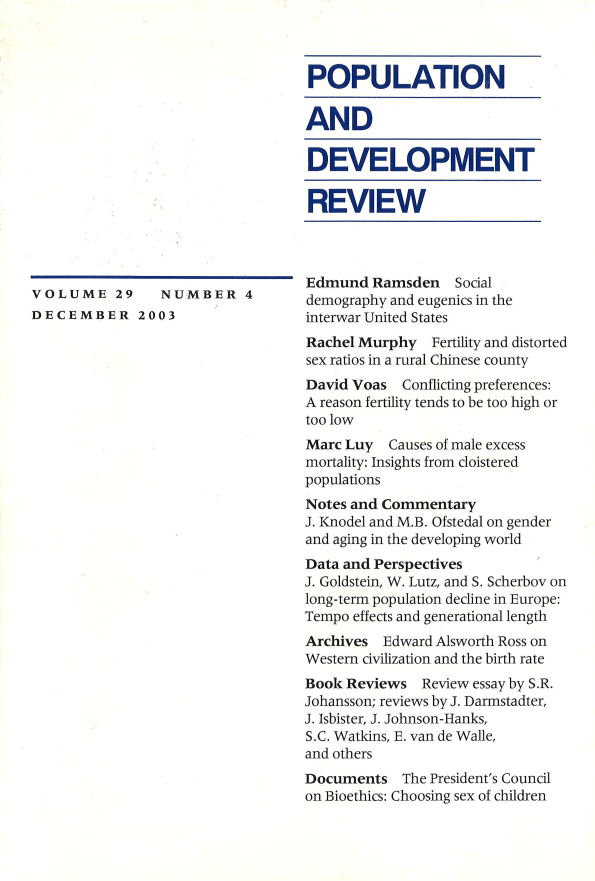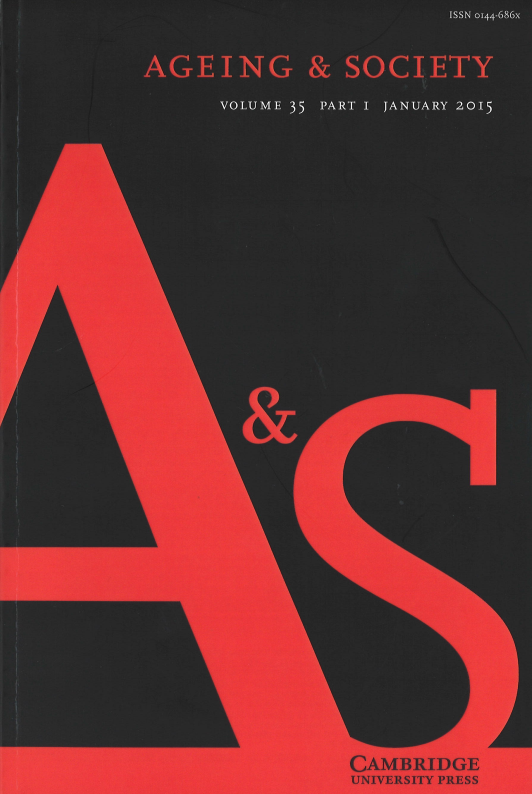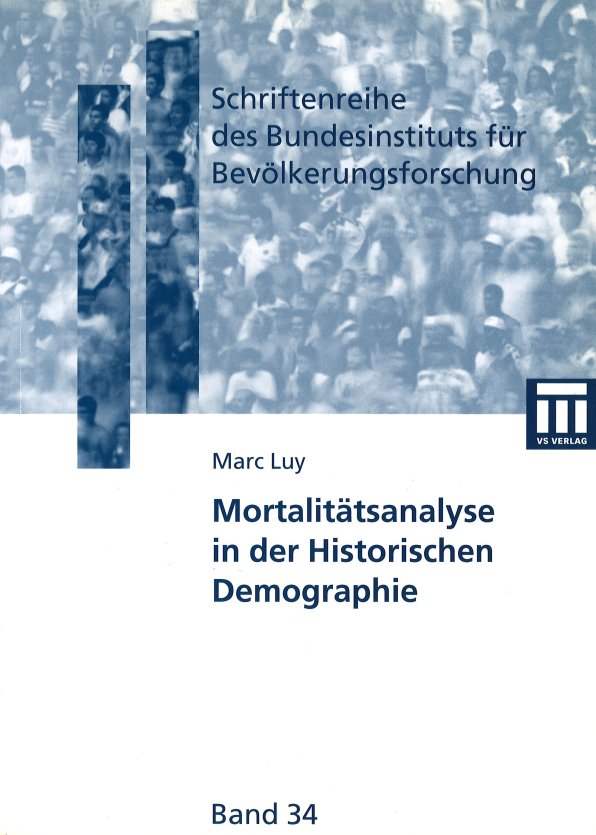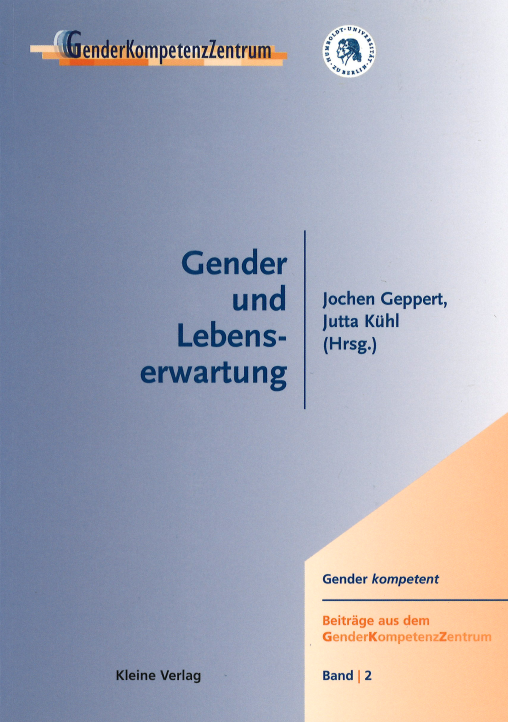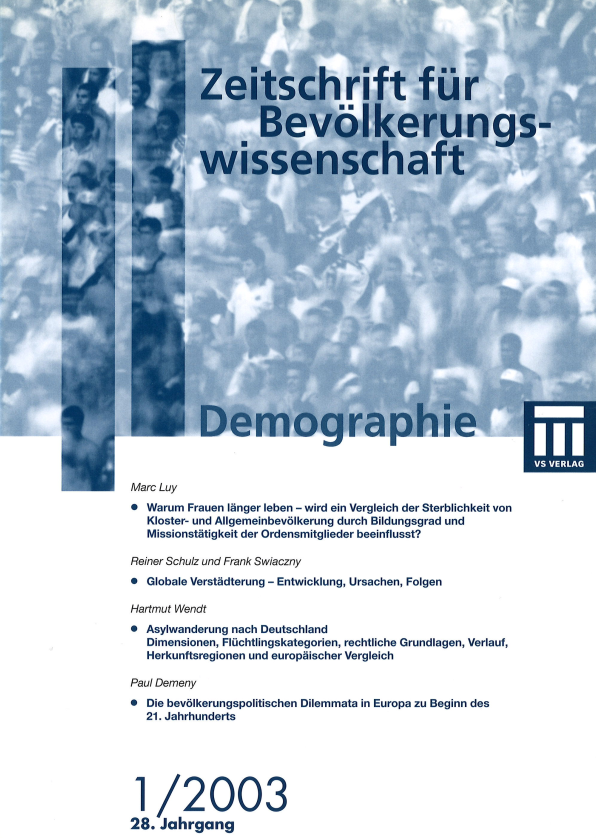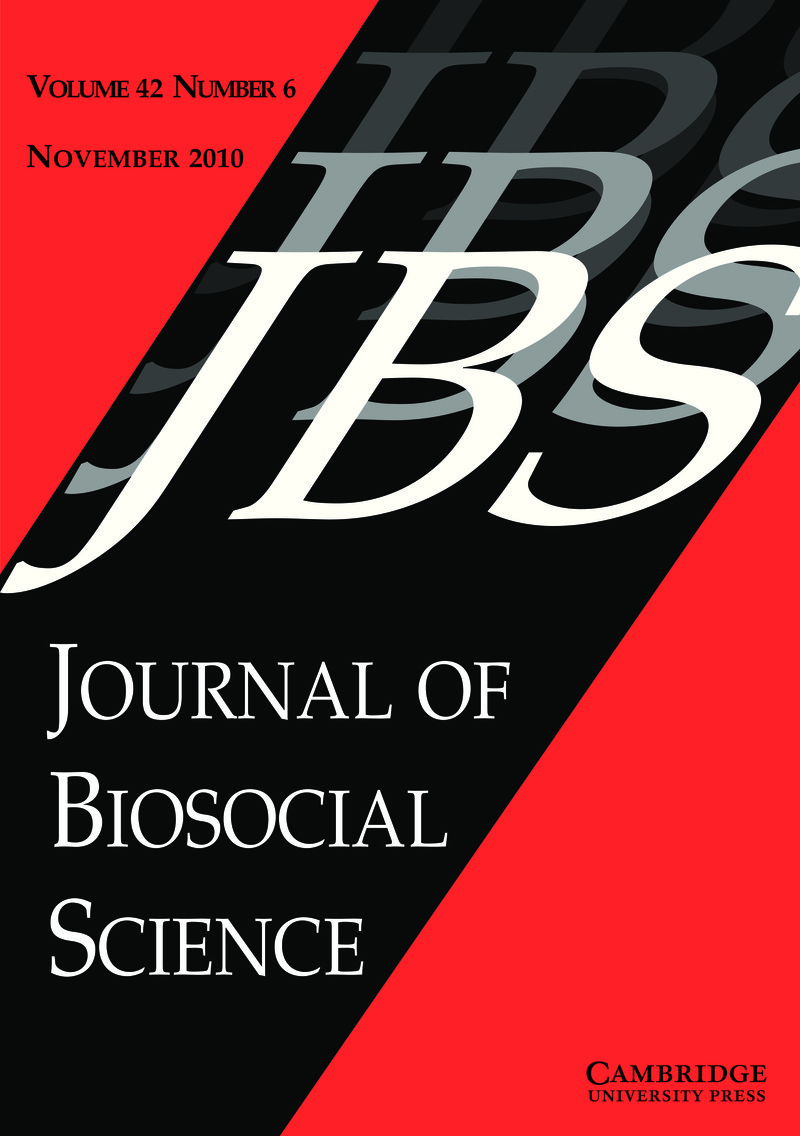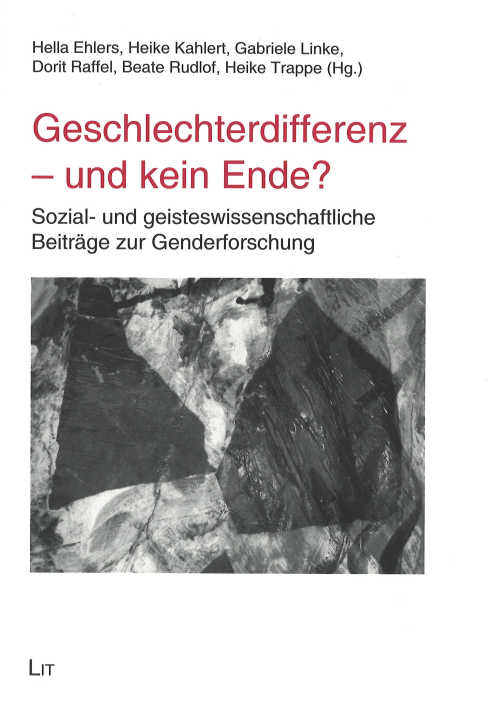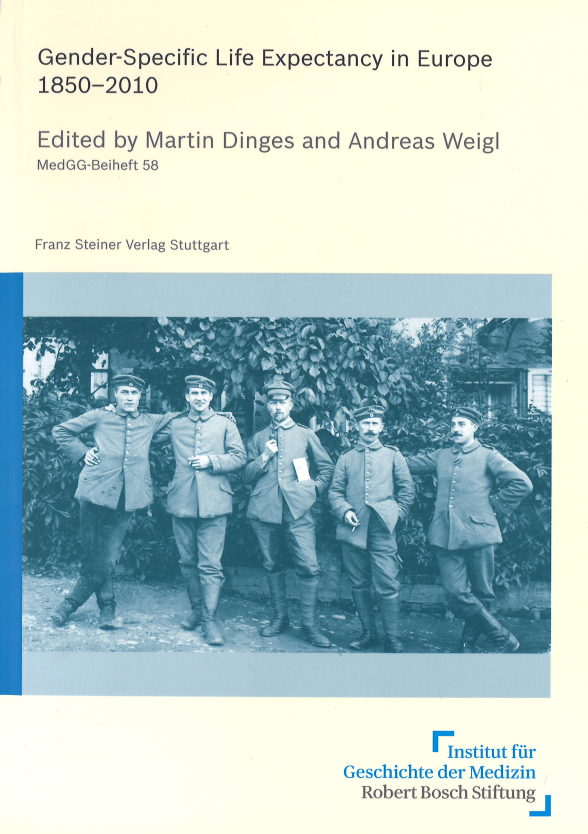Publikationen / Publications
Infoblatt / Newsletter QUAESTIO DE MONASTERIIS
Zeitschriftenartikel, Bücher, Buchbeiträge / Journal articles, books, book chapters
- Schmitz, Alina; Lazarevic, Patrick; Luy, Marc, 2024: No Socioeconomic Inequalities in Mortality among Catholic Monks: A Quasi-Experiment Providing Evidence for the Fundamental Cause Theory, Journal of Health and Social Behavior: online first, doi: 10.1177/00221465241291847 (published online: 14.11.2024)
- Lazarevic, Patrick; Di Giulio, Paola; Pfister, Amanda; Luy, Marc, 2023: Der Gesundheits-Survey der Klosterstudie. Daten- und Methodenbericht zu Welle 4. VID Forschungsbericht, No. 43; Vienna: Austrian Academy of Sciences.
- Wiedemann, Angela; Bowen, Catherine E.; Di Giulio, Paola; Krivanek, Desiree; Marcher, Anja; Sauerberg, Markus; Wegner-Siegmundt, Christian; Luy, Marc, 2022: Der Gesundheits-Survey der Klosterstudie. Daten- und Methodenbericht zu Welle II und Welle III. VID Forschungsbericht 41; Vienna, Austrian Academy of Sciences.
- Luy, Marc (ed.), 2021: The male-female health-mortality paradox: research report of the ERC project HEMOX. VID Forschungsbericht 40. Vienna, Austrian Academy of Sciences.
- Luy, Marc, 2020: Understanding the cross-sectional association between life expectancy and healthy life years: the CroHaM hypothesis. VID Working Papers 03/2020.
- Bowen, Catherine E.; Luy, Marc, 2018: Community social characteristics and health at older ages: evidence from 156 religious communities, The Journals of Gerontology Series B: Psychological Sciences and Social Sciences 73(8): 1426-1438 (published online: 29.08.2016).
- Luy, Marc, 2016: The impact of biological factors on sex differences in life expectancy: insights from a natural experiment, in: Dinges M.; Weigl A. (eds.): Gender-specific life Expectancy in Europe 1850–2010, Stuttgart, Steiner: 17-46.
- Luy, Marc; Flandorfer, Priska; Di Giulio, Paola, 2015: Ageing in an aged society: experiences and attitudes of Catholic order members towards population ageing and older people, Ageing & Society 35(1): 1-36.
- Wiedemann, Angela; Marcher, Anja; Wegner-Siegmundt, Christian; Di Giulio, Paola; Luy, Marc, 2014: Der Gesundheits-Survey der Klosterstudie. Daten- und Methodenbericht zu Welle 1 [The health survey of the Cloister Study. Data and methods report for wave 1], VID Forschungsbericht Nr. 37, Wien, Institut für Demographie der Österreichischen Akademie der Wissenschaften.
- Luy, Marc; Wegner, Christian, 2011: Lebe langsam, stirb alt - geschlechterspezifische Mortalitätsforschung mit der Klosterstudie [Live slowly, die old - sex-specific mortality research with the Cloister Study], Journal für Gynäkologische Endokrinologie 21(4): 18.
- Luy, Marc; Wegner, Christian, 2011: “Lebe langsam - stirb alt. Eine geschlechterspezifische Studie über Klosterleben und Lebenserwartung” [Live slowly - die old. A sex-specific study of monatic life and life expectancy], Ärzte Woche 25(46): 16.
- Luy, Marc, 2011: Ursachen der Geschlechterdifferenz in der Lebenserwartung. Erkenntnisse aus der Klosterstudie [Causes of sex differences in life expectancy. Insights from the Cloister Study], Swiss Medical Forum (Schweizerisches Medizin-Forum) 11(35): 580-583.
- Luy, Marc, 2011: Causes de la différence d’espérance de vie entre les sexes. Résultats de l’étude des cloîtres [Causes of sex differences in life expectancy. Insights from the Cloister Study], Swiss Medical Forum (Forum Médical Suisse) 11(35): 580-583.
- Luy, Marc, 2009: Unnatural deaths among nuns and monks: is there a biological force behind male external cause mortality?, Journal of Biosocial Science 41(6): 831-844.
- Luy, Marc, 2009: 10 Jahre Klosterstudie – gewonnene Erkenntnisse und offene Fragen zu den Ursachen für die unterschiedliche Lebenserwartung von Frauen und Männern [10 years Cloister Study – findings and open questions with regard to the causes of different life expectancies of women and men], in Ehlers, H.; Kahlert, H.; Linke, G.; Raffel, D.; Rudlof, B.; Trappe, H. (eds.): Geschlechterdifferenz – und kein Ende? Sozial- und geisteswissenschaftliche Beiträge zur Genderforschung, Berlin, LIT Verlag: 251-273.
- Luy, Marc, 2009: Warum Mönche länger leben - Erkenntnisse aus zehn Jahren Klosterstudie [Why monks live longer – findings from ten years cloister study], in Gruner, P.-H.; Kuhla, E. (eds.): Befreiungsbewegung für Männer. Auf dem Weg zur Geschlechterdemokratie: Essays und Analysen, Gießen, Psychosozial-Verlag: 259-276.
- Luy, Marc, 2008: Warum Frauen länger leben – oder Männer früher sterben? Zu Ursachen und Entwicklung der Geschlechterdifferenz in der Lebenserwartung [Why women live longer – or men die earlier? On causes and trends of gender differences in life expectancy], Traditio et Innovatio 13(1): 44-46.
- Luy, Marc, 2007: Lebenserwartung von Männern und Frauen [Life expectancy of men and women], in Tivig, T.; Hetze, P. (eds.): Deutschland im Demografischen Wandel, Rostock, Klatschmohn: 36-37.
- Luy, Marc, 2006: Leben Frauen länger oder sterben Männer früher? [Do women live longer or do men die earlier?], Public Health Forum 14(50): 18-20.
- Luy, Marc, 2006: Ursachen der männlichen Übersterblichkeit: Eine Studie über die Mortalität von Nonnen und Mönchen [Causes of male excess mortality: a study on the mortality of nuns and monks], in: Geppert, J.; Kühl, J. (eds.): Gender und Lebenserwartung, Gender kompetent – Beiträge aus dem GenderKompetenzZentrum, Vol. 2, Bielefeld, Kleine: 36-76.
- Luy, Marc, 2004: Mortalitätsanalyse in der Historischen Demographie: Die Erstellung von Periodensterbetafeln unter Anwendung der Growth-Balance-Methode und statistischer Testverfahren [Mortality analysis in historical demography: the construction of period life tables by using the growth balance method and statistical tests], Wiesbaden, VS Verlag für Sozialwissenschaften.
- Luy, Marc, 2003: Causes of male excess mortality: insights from cloistered populations, Population and Development Review 29(4): 647-676.
- Luy, Marc, 2003: “Warum Frauen länger leben – wird ein Vergleich der Sterblichkeit von Kloster- und Allgemeinbevölkerung durch Bildungsgrad und Missionstätigkeit der Ordensmitglieder beeinflusst?“ [Why women live longer – do education level and missionising activity of order members affect the comparison of general and cloistered populations?], Zeitschrift für Bevölkerungswissenschaft 28(1): 5-35.
- Luy, Marc, 2002: Warum Frauen länger leben – Erkenntnisse aus einem Vergleich von Kloster- und Allgemeinbevölkerung [Why women live longer – insights from a comparison of cloistered and general populations], Materialien zur Bevölkerungswissenschaft 106, Wiesbaden, Bundesinstitut für Bevölkerungsforschung.
- Luy, Marc, 2002: “Warum Frauen länger leben. Erkenntnisse aus einem Vergleich von Kloster- und Allgemeinbevölkerung“ [Why women live longer. Insights from a comparison of cloistered and general populations], Mitteilungen der Deutschen Gesellschaft für Demographie 1(3): 4-5.
- Dinkel, Reiner H.; Luy, Marc, 1999: “Natur oder Verhalten? Ein Beitrag zur Erklärung der männlichen Übersterblichkeit durch einen Vergleich von Kloster- und Allgemeinbevölkerung“ [Nature or behaviour? An article explaining the phenomenon of male excess mortality through a comparison between monastic and general population], Zeitschrift für Bevölkerungswissenschaft 24(2): 105-132.
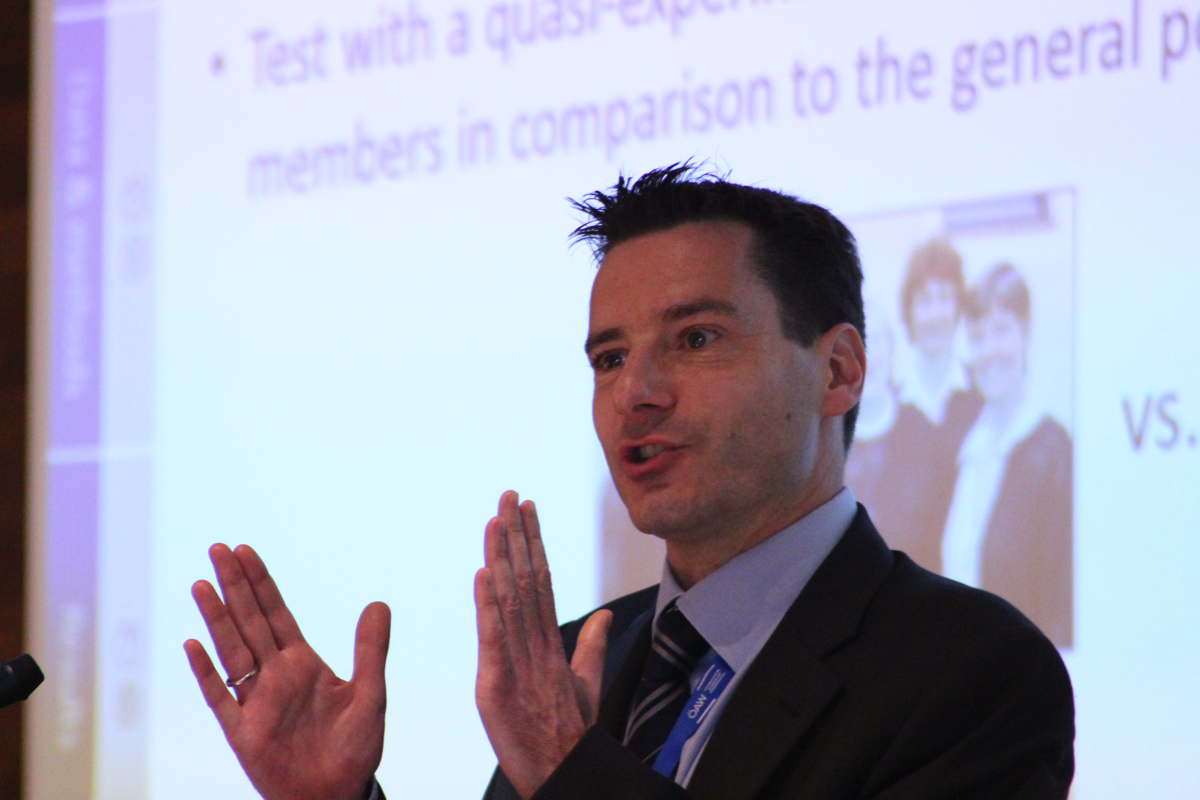
Vorträge / Presentations
- Vita religiosa: Korrelation zwischen religiösem Leben und Gesundheit [Vita religiosa: Correlation between religious life and health], 19. Symposium der Maimonides Lectures, Vienna, Austria, 14.11.2024. (M. Luy)
- Die Klosterstudie zur Erforschung der Determinanten von Gesundheit und Langlebigkeit – Follow-up 2024 [The Cloister Study to research the determinants of health and longevity—Follow-up 2024], 37. Jenapharm-Symposium: Praktische Endokrinologie für Frauenärzt:innen, Weimar, Germany, 20.06.2024. (M. Luy)
- Langlebigkeit: Warum Frauen länger leben als Männer und was wir alle daraus lernen können [Longevity: Why women live longer than men and what we can all learn from it], Keynote at the 23rd Seniorenenquete (seniors’ enquete) of the Province of Tyrol, Innsbruck, Austria, 18.11.2022. (M. Luy)
- Die unterschiedliche Lebenserwartung von Frauen und Männern: Versuch der Entwirrung eines komplexen Ursachengefüges [The difference in life expectancy between women and men: an attempt to disentangle a complex set of causes], Keynote at the 13. Annual Meeting of the Austrian Association for Gender-specific Medicine, Vienna, Austria, 21.10.2022. (M. Luy)
- Warum Männer früher sterben als Frauen: Biologische Faktoren, Gesundheitsverhalten und sozio-ökonomische Rahmenbedingungen [Why men die earlier than women: biological factors, health behaviour, and socio-economic conditions], Dienstagsdialoge für ein Einstein Center for Population Diversity, Berlin, Germany, Online, 06.09.2022. (M. Luy)
- Warum Mädchen länger leben als Jungs [Why girls live longer than boys], Lecture in the framework of the ÖAW program #Youngscience: Academy in the Classroom, Handelsakademie und Handelsschule Neusiedl am See, Austria, 06.04.2022. (M. Luy)
- Subjektive und objektive Gefährdungen der Gesundheit: Der Einfluss der Coronapandemie auf die subjektive Gesundheit [Subjective and objective threats to health: the impact of the corona pandemic on subjective health], Workshop "Alter(n) in Zeiten von Katastrophen und Krisen" der Sektion Alter(n) und Gesellschaft der Deutschen Gesellschaft für Soziologie, Munich, Germany, 10.09.2021 (P. Lazarevic)
- Inequalities in life expectancy and lessons to be learned, Seminar of the Amsterdam Centre for Inequality Studies (AMCIS), University of Amsterdam, The Netherlands, 17.10.2019. (M. Luy)
- Warum Frauen älter werden als Männer [Why women become older than men], Lecture at the International Academy, Traunkirchen, Austria, 15.08.2018. (M. Luy)
- Männergesundheitsaspekte aus der Klosterstudie [Insights on men's health from the Cloister Study], Conference "Masculinity and Health" of the Austrian Federal Ministry for Labour, Social Affairs, Health and Consumer Protection, Vienna, Austria, 19.06.2018. (M. Luy)
- Warum leben Frauen länger als Männer? [Why do women live longer than men?], Lange Nacht der Forschung, Wien, Österreich, 13.04.2018. (M. Luy)
- Die Klosterstudie: Bisherige Ergebnisse und Folgerungen für die Ordensgemeinschaften [The Cloister Study: actual results and implications for religious communities], Seminar at the directors' conference of the German province of the Salesians of Don Bosco, Aschau/Inn, Germany, 23.11.2017. (M. Luy)
- Inherent sex differences and disease: what can we learn from Catholic order members?, XXVIII IUSSP International Population Conference, Cape Town, South Africa, 03.11.2017. (A. Wiedemann)
- Erfolgreiches Altern in Klöstern? Eine soziologische Studie über Auswirkungen einer verlängerten Arbeitszeit auf Gesundheit und Wohlbefinden von Ordensleuten in Österreich, 18th German-Austrian-Swiss Demographers' Meeting, Neuchâtel, Switzerland, 17.10.2017. (D. Krivanek)
- Ora et labora: Eine gesundheitssoziologische Studie über die Auswirkungen der längeren Lebensarbeitszeit von Ordensleuten in Österreich auf deren Gesundheit und Lebensqualität, Statistical Week/Annual Meeting of the German Demographic Association, Rostock, Germany, 19.09.2017. (D. Krivanek)
- Do sex differences in diseases have a biological component? Evidence from religious orders in Germany and Austria, 25th Annual Population Postgraduate Conference (PopFest 2017), Stockholm, Sweden, 31.05.2017. (A. Wiedemann)
- A hint of evidence for a biological component in sex differences in diseases, XXIX REVES Meeting, Santiago de Chile, 18.05.2017. (A. Wiedemann)
- Warum leben Frauen länger als Männer? [Why do women live longer than men?], MontagsForum of the Bildungs- und Kulturforum Ostschweiz, St. Gallen, Switzerland, 13.03.2017. (M. Luy)
- The influence of early life socioeconomic factors and health status on disease risk and morbidity in adulthood: findings from the Cloister Study, 2016 European Population Conference, Mainz, Germany, 03.09.2016. (A. Wiedemann)
- Community social characteristics and health at older ages: evidence from 156 religious communities, 2016 European Population Conference, Mainz, Germany, 02.09.2016. (C. E. Bowen, M. Luy)
- Enduring influences of socio-economic circumstances in childhood on adult health: Findings from the Cloister Study, 2016 PopFest Conference, University of Manchester, United Kingdom, 05.07.2016. (A. Wiedemann)
- Testing the gender and health paradox: insights from a natural experiment, 2016 Annual Meeting of the Population Association of America (PAA), Washington, D.C., USA, 01.04.2016. (M. Luy, A. Wiedemann, C. Wegner-Siegmundt, P. Di Giulio)
- Relationships between health and longevity, Research seminar of the Luxembourg Institute of Socio-Economic Research (LISER), Esch/Alzette, Luxembourg, 24.02.2016. (M. Luy)
- Längeres Leben = mehr gesunde Lebenszeit? Erkenntnisse aus der Deutsch-Österreichischen Klosterstudie [Longer lives = more healthy life years? Insights from the German-Austrian Cloister Study], German-Austrian-Swiss Demographers' Meeting, Munich, Germany, 29.10.2015. (C. Wegner-Siegmundt)
- The impact of biological factors on gender differences in life expectancy: results from a natural experiment, Trentennial ESHRE Capri Workshop "Gender related health: biological mechanisms and lifestyle factors", Anacapri, Italy, 28.08.2015. (M. Luy)
- The relationships between longevity and different dimensions of health: findings from the Cloister Study, XXVII REVES Meeting, Singapore, 04.06.2015. (M. Luy, C. E. Bowen, P. Di Giulio, C. Wegner-Siegmundt, A. Wiedemann)
- Towards a better understanding of the "male-female health-mortality paradox". First results of the Health Survey of the German-Austrian Cloister Study, 2014 European Population Conference, Budapest, Hungary, 27.06.2014. (A. Wiedemann, C. Wegner-Siegmundt, P. Di Giulio, M. Luy)
- Causal mechanisms behind the association of education and mortality in men: insights from a natural experiment, REVES XXVI conference, Edinburgh, Scotland, 30.05.2014. (M. Luy, C. Wegner-Siegmundt, P. Di Giulio)
- Direct effect of education on mortality in men: insights from a natural experiment, 2014 Annual Meeting of the Population Association of America (PAA), Boston, USA, 03.05.2014. (M. Luy, C. Wegner-Siegmundt, P. Di Giulio)
- Deutsch-Österreichische Klosterstudie: Erforschung von Gesundheit und Langlebigkeit [German-Austrian Cloister Study: research on health and longevity], Sociological lectures at the Institute for Sociology of the Vienna University, Austria, 22.04.2013. (M. Luy)
- The direct effect of education on mortality: insights from the Cloister Study, 2012 European Population Conference (EPC), Stockholm, Sweden, 15.06.2012. (M. Luy, C. Wegner-Siegmundt, P. Di Giulio)
- Lebe langsam, lebe lang? Ergebnisse aus der Klosterstudie [Live slowly, live long? Results from the Cloister Study], 25th Jenapharm Symposium "Practical endocrinology for gynaecologists" [Praktische Endokrinologie für Frauenärzte], Weimar, Germany, 24.03.2012. (M. Luy)
- Lebe langsam - stirb alt: geschlechterspezifische Mortalitätsforschung mit der Klosterstudie [Live slowly - die old: sex-specific mortality research with the Cloister Study], Menopause-Andropause-Anti-Aging-Congress, Vienna, Austria, 08.12.2011. (M. Luy, C. Wegner-Siegmundt)
- Warum Frauen länger leben - oder Männer früher sterben? Zu den Ursachen der Geschlechterunterschiede in der Lebenserwartung [Why women live longer - or men die earlier? On causes of sex differences in life expectancy], 13. K&A Brand Success Congress [MarkenErfolgsKongress], Nuremberg, Germany, 24.11.2011. (M. Luy)
- 15 Jahre "Klosterstudie": Gewonnene Erkenntnisse, offene Fragen und zukünftige Forschung [15 years "Cloister Study": gained insights, open questions and future research], German-Austrian-Swiss Demographers' Meeting, Oberhofen am Thunersee, Switzerland, 20.10.2011. (M. Luy, C. Wegner-Siegmundt)
- Why monks live longer but nuns do not: a summary of 15 years "Cloister Study", International Workshop "Health, Morbidity and Mortality: the State of the Art" of the European Working Group on health, Morbidity and Mortality, Vienna, Austria, 03.09.2011. (M. Luy, C. Wegner-Siegmundt)
- Past and future directions of the German-Austrian "Cloister Study", Rush University Medical Center, Chicago, USA, 23.08.2011. (M. Luy)
- Sex differences in health and mortality: obtained results and future aims of the "Cloister study", 23rd REVES Meeting, Paris, France, 25.05.2011. (M. Luy)
- Alterung in einer gealterten Gesellschaft: Katholische Ordensmitglieder und ihre Erfahrungen mit und Einstellungen zu Bevölkerungsalterung und alten Menschen [Ageing in an aged society: experiences and attitudes of Catholic order members towards population ageing and older people]. Annual Meeting of the German Demographic Association, Bonn, Germany, 11.03.2011. (M. Luy, P. Flandorfer)
- Die unterschiedliche Lebenserwartung von Frauen und Männern: biologische, gesellschaftliche und verhaltensbedingte Ursachen [Life expectancy differences between women and men: biological, societal and behavioural causes], Colloquium of the Institute for Sociology of the Georg August University Göttingen, Germany, 19.01.2011. (M. Luy)
- Long-living females and short-living males: the interplay of sex and gender, Conference "Health Inequalities V", University of Bielefeld, Germany, 11.06.2010. (M. Luy)
- The biological force behind excess male external cause mortality: an analysis of unnatural deaths among catholic order members, 2010 Annual Meeting of the Population Association of America (PAA), Dallas, USA 15.04.2010. (M. Luy)
- Warum Männer früher sterben und Frauen länger leben [Why men die earlier and women live longer], Förderverein Schmallenbachhaus e.V., Fröndenberg, Germany, 04.02.2010. (M. Luy)
- Die unterschiedliche Lebenserwartung von Frauen und Männern - Erkenntnisse über Entwicklung und Ursachen aus der demographischen Forschung [Life expectancy differences between women and men - demographic insights into trends and causes], Graduate school "Statistic Models", University of Dortmund, Germany, 20.11.2008. (M. Luy)
- Warum Männer früher sterben [Why men die earlier], Advanced training workshop of the Apothekerstiftung Westfalen-Lippe, Münster, Germany, 30.08.2008. (M. Luy)
- Why do women live longer than men? Findings from the Cloister Study, European Science Open Forum (ESOF) 2008, Barcelona, Spain, 22.07.2008. (M. Luy)
- Geschlechterspezifische Morbidität und Mortalität [Gender-specific morbidity and mortality], Spring congress of the Apothekerkammer Schleswig-Holstein "Gender in der Medizin und Pharmazie", Ostseebad Damp, Germany, 13.04.2008. (M. Luy)
- Geschlechtsspezifische Mortalitätsdifferenzen [Gender differences in mortality], First Interdisciplinary Colloquium on "Gender Research" at the University of Rostock, 01.12.2007. (M. Luy)
- Sex versus Gender - zu den Ursachen der unterschiedlichen Lebenserwartung von Frauen und Männern [Sex versus gender - about the causes of differences in life expectancy between women and men], Lecture series "Genderorientierung in Public Health und Pflege", University of Bremen, Germany, 05.11.2007. (M. Luy)
- Variations of human life expectancy: biological versus non-biological factors, Inflammatory Diseases of Barrier Organs Meeting 2007, International NGFN-Symposium, Kiel, Germany, 12.07.2007. (M. Luy)
- Warum Frauen länger leben - oder Männer früher sterben? Zu Ursachen und Entwicklung der Geschlechterdifferenz in der Lebenserwartung [Why women live longer - or men die earlier? About causes and trends of sex differences in life expectancy], Lecture series "Der alternde Mensch in einer alternden Gesellschaft", University of Rostock, Germany, 13.06.2007. (M. Luy)
- Do women live longer or do men die earlier? Findings from the Cloister Study, University of Michigan, Institute for Social Research, Ann Arbor, USA, 27.03.2007. (M. Luy)
- Der Einfluss von Verhaltensweisen und Lebensstilen auf die Mortalitätsdifferenzen der Geschlechter [The impact of health behaviours and health lifestyles on gender differences in mortality], Ruprecht Karls University Heidelberg, Institute for Gerontology, Germany, 05.02.2007. (M. Luy)
- Warum Frauen länger leben - oder Männer früher sterben? [Why women live longer - or men die earlier?], Long Night of Sciences 2006 at the University of Rostock, 27.04.2006. (M. Luy)
- Ursachen und Entwicklung der Geschlechterdifferenz in der Lebenserwartung - Einführung aus der Perspektive der Demographie [Causes and trends of sex differences in life expectancy - introduction from a demographic point of view], Workshop "Frauen leben länger? Männer leben (also) kurz??? - aus der Forschung zu Gender und Lebenserwartung" of the Gender Kompetenz Zentrum of the Humboldt University, Berlin, Germany, 09.05.2005. (M. Luy)
- Warum werden Frauen älter als Männer? Eine Einführung in demographische Fragestellungen [Why do women become older than men? An introduction into demographic problems], University of Freiburg i. Br., Germany, 31.01.2005. (M. Luy)
- Why do women live longer than men? New insights from cloistered populations, Human Genetic - Immune Genetic Colloquium of the University of Göttingen, Germany, 16.11.2004. (M. Luy)
- Warum Frauen länger leben - ein Vergleich von Kloster- und Allgemeinbevölkerung [Why women live longer - a comparison of monastic and general populations], Colloquium of the Institute for Human Genetics and Anthropology of the University Freiburg i. Br., Germany, 09.06.2004. (M. Luy)
- Inwieweit wird die höhere Lebenserwartung der Frauen biologisch verursacht? Erkenntnisse aus einem Vergleich von Kloster- und Allgemeinbevölkerung [To what extent is the higher life expectancy of women biologically caused? Insights from a comparison of monastic and general populations], Soroptimist International, Deutsche Union Club Wiesbaden, Germany, 05.05.2004. (M. Luy)
- Die Bedeutung biologischer Faktoren für das Entstehen der männlichen Übersterblichkeit - Erkenntnisse aus einem Vergleich von Kloster- und Allgemeinbevölkerung [The impact of biological factors on male excess mortality - insights from a comparison of cloistered and general populations], Workshop of the working group on “Medical Demography” of the German Demographic Association, Greifswald, 26.09.2003. (M. Luy)
- Behaviour or biology? An answer to the question of male excess mortality by comparing the cloistered and the general populations, 2003 European Population Conference (EPC), Warsaw, Poland, 28.08.2003. (M. Luy)
- Nature or behaviour? An answer to the question of male excess mortality by a comparison of monastic and general population, 13th Congress of the European Anthropological Association, Zagreb, Croatia, 31.08.2002. (M. Luy)
- Warum Frauen länger leben - Erkenntnisse aus einem Vergleich von Kloster- und Allgemeinbevölkerung [Why women live longer - insights from a comparison of cloistered and general populations], 2002 Annual Meeting of the German Demographic Association, Rostock, 12.07.2002. (M. Luy)
- Ursachen der geschlechtsspezifischen Sterblichkeitsunterschiede. Ergebnisse einer Mortalitätsanalyse in bayerischen Frauen- und Männerklöstern [Causes of sex mortality differences. Insights from a mortality analysis in female and male Bavarian monasteries], Rostock Demographic Colloquium, Max Planck Institute for Demographic Research, Rostock, Germany, 03.11.1998. (M. Luy)
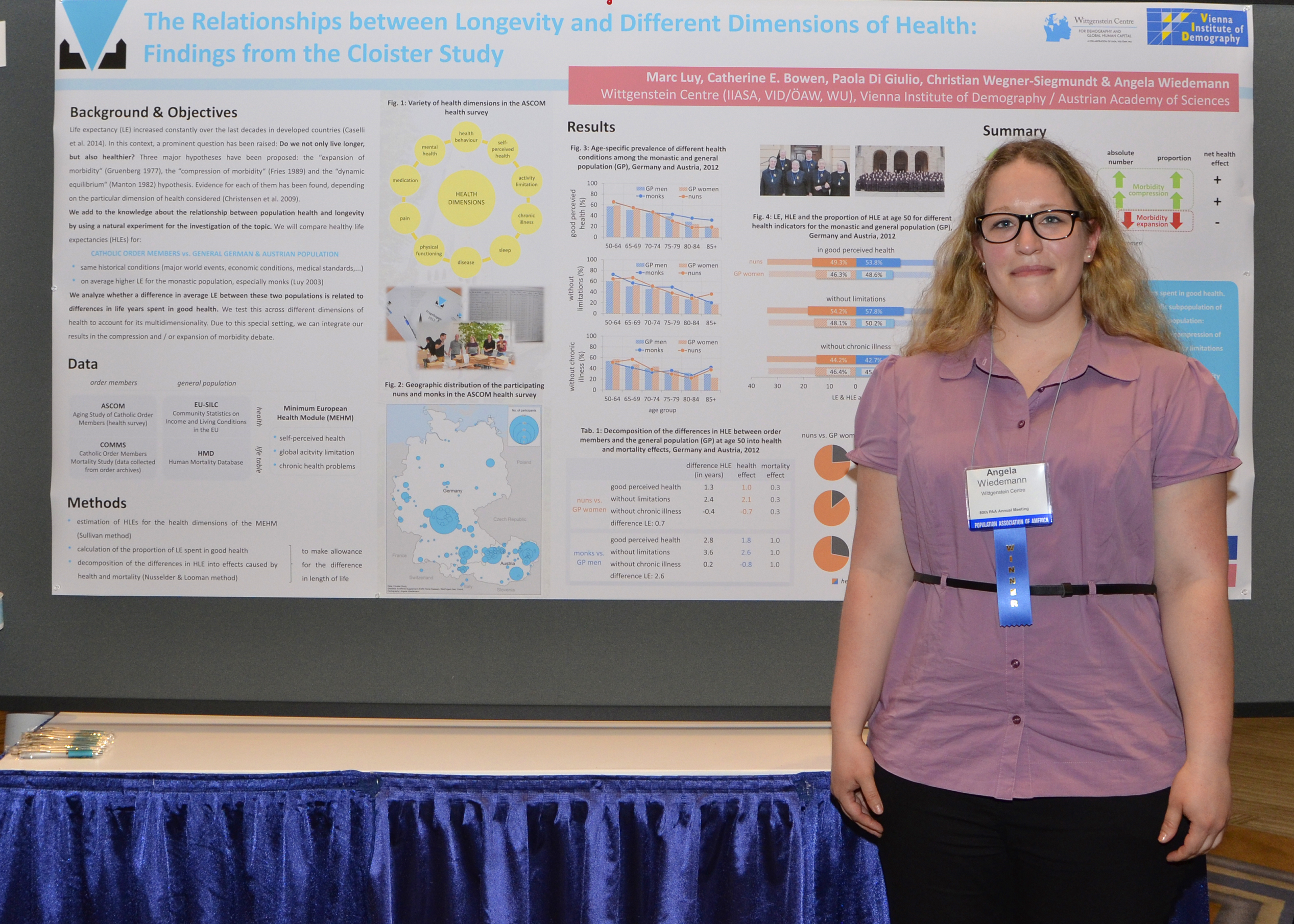
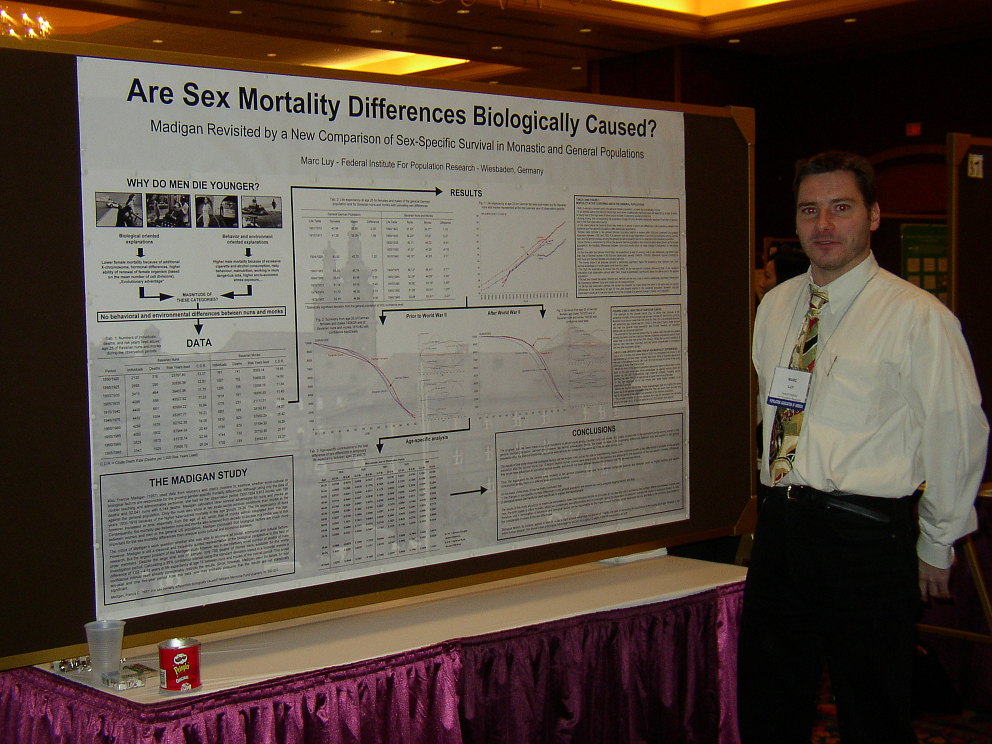
Posterpräsentationen / Posters
- Socioeconomic status and health outcomes: A comparison of monastic and general population, Popdays 2019 Conference of the SIS-AISP (Italian Society of Statistics – Italian Association for Population Studies), Mailand, Italien, 25.01.2019 (P. Di Giulio)
- Successful Aging in Monasteries? A Qualitative Study on the Impact of Longer Working Life on Health and Quality of Life of Order Members in Austria, 2018 European Population Conference, Brüssel, Belgien, 07.06.2018. (D. Krivanek)
- Ora e labora (pray and work): a sociological health study on the impact of longer working life on health and quality of life of order members in Vienna, 2017 Annual Meeting of the Population Association of America (PAA), Chicago, USA, 26.04.2017. (D. Krivanek)
- Successful Aging in monasteries? A health study on the impact of extending working life on health and well-being of order members in Austria, Annual Meeting of the Italian Association for Population Studies (Giornate di Studio sulla Popolazione), Florence, Italy, 09.02.2017. (D. Krivanek)
- The relationships between longevity and different dimensions of health: findings from the Cloister Study, 2015 Annual Meeting of the Population Association of America (PAA), San Diego, USA, 30.04.2015. (M. Luy, C. E. Bowen, P. Di Giulio, C. Wegner-Siegmundt, A. Wiedemann)
- The association between education and mortality in a sample of 3,060 Catholic monks from Germany, The Gerontological Society of America's 67th Annual Scientific Meeting, Washington, DC, USA, 07.11.2014. (M. Luy, C. Wegner-Siegmundt, P. Di Giulio)
- Ageing in an aged society: experiences and attitudes of catholic order members towards population ageing and older people, 2011 Annual Meeting of the Population Association of America (PAA), Washington, DC, USA, 31.03.2011. (M. Luy, P. Flandorfer)
- Are sex mortality differences biologically caused? Madigan revisited by a new comparison of sex-specific survival in monastic and general populations, 2003 Annual Meeting of the Population Association of America (PAA), Minneapolis, Minnesota, USA, 02.05.2003. (M. Luy)
